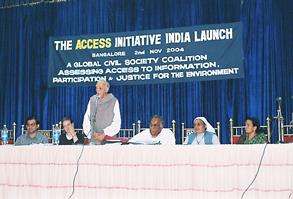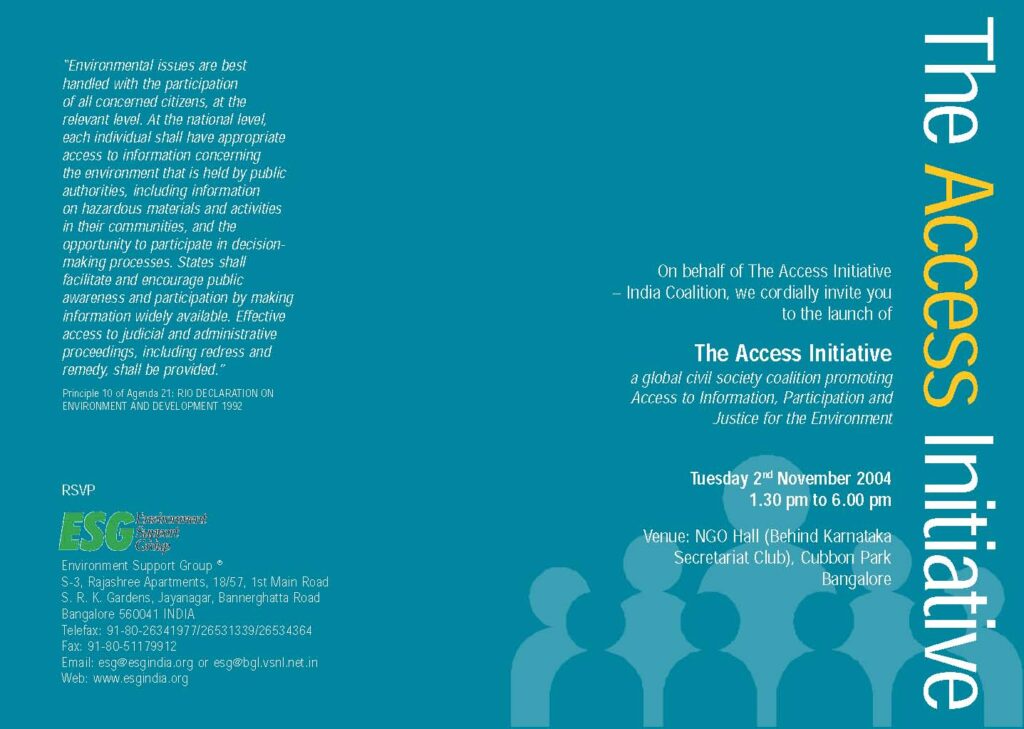The Access Initiative – India
(Download PDF Version of Report here.)
Background

The Access Initiative (TAI) is a global coalition of civil society organisations collaborating to promote national implementation of commitments to access to information, participation, and justice in decision-making that affects the environment.
TAI is coordinated by six organizations: Corporación PARTICIPA (Chile), Thailand Environment Institute (Thailand), World Resources Institute (United States), Environmental Management and Law Association (Hungary), IA- Mexico (Mexico), and Advocates Coalition for Development and Environment (Uganda). The network is growing in many parts of the world and the formation of TAIIndia Coalition marks a significant step forward in this process. Government, corporate, non-governmental and research organizations have actively collaborated in this exercise, the result of which is the development of the Access Indicators software, providing tools for assessment. In addition a report entitled “Closing the Gap” has been produced that highlights the extents of compliance of various national governments to The Access Principles (more information at www.accessinitiative.org).
TAI and India
For TAI-India to be effective in terms of holding the government accountable to its commitments, it is important to understand how and why TAI is relevant to India, what is its potential, what is its methodological framework, and how the framework can be adapted.
TAI: Its relevance to India
In the prevailing context, the obvious question is: in what way can TAI help NGOs, social movements, researches and activists who are already tackling issues relating to accessing information, ensuring participation and securing justice? In other words, how is TAI useful in leveraging these efforts in India? And why would the government pay attention if TAI is employed by groups, when it is currently systematically ignoring all these concerns.
Over the years, NGOs, social movements, and individuals have used a range of techniques and strategies in dealing with environmental issues – protests and rallies, civil disobedience, satyagraha, petitions, lobbying, media pressure, public interest litigations, and so on. The government, in particular the bureaucracy, are also becoming proficient in tackling this language of response and have learnt to handle these strategies adeptly. In this context, TAI could assume importance as a new language for engaging the government and presenting a framework for collaborative efforts between civil society and government to improve transparency and accountability and increase access to governance. It is at once an assessment methodology and a reformative process. But the main strength of TAI is in its methodology. The rigour of approach determines the quality of use of TAI and its impact on environmental decision-making systems.
Launch of the Access Initiative in India

Based on an India pilot assessment, when some sectors were tested on The Access Indicators methodology, a workshop was held in Chandigarh during March 2004, coordinated by IDMA Foundation, Chandigarh, with wide representation from the Ministry of Environment and Forests, Central and State Pollution Control Boards, media persons and NGOs and research organization from India, Nepal and Sri Lanka.
It was then decided to launch this initiative on a comprehensive and wider scale in India involving the development of active relationship between government, corporate, non-governmental organizations, media and research organizations in highlighting how India’s experience fares with regard to the Access Principles.
Keeping this objective in view a workshop/launch of the Access Initiative was held from 31st Oct to 3rd Nov, 2004 in Bangalore. (see the program – page 1, page 2) About 40 groups actively involved in initiatives relating environmental decision making in India participated. The first three days, which was the workshop part, involved discussion and training on the Access Principles and the use of the Access Indicators software. The fourth day constituted a public launch to advocate the need for environmental governance in India to actively identify with Access Principles.
Three Access Principles
Access to Information: is defined as the ability of citizens to obtain environmental information in the possession of public authorities. “Environmental information” includes information about air and water quality, for example, and information about whether any hazardous chemicals are stored at a nearby factory.
Access to Participation: is defined as the opportunity for citizens to provide informed, timely and meaningful input and influence decisions on general policies, strategies and plans at various levels and on individual projects that have environmental impacts. Individuals may, for example, engage in electoral processes, testify at hearings and meetings, serve on advisory committees, have direct contact with public officials, express views and opinions through the media, or engage in some form o protest action.
Access to Justice: is defined as the ability of citizens to turn to impartial arbiters to resolve disputes over access to information and participation in decisions that affect the environment. Such impartial arbiters include mediators, administrative courts, and formal courts of law, among others
Goals of The Access Initiative
- To strengthen the capacity of public interest groups to track progress toward and build a global constituency for national level implementation of a set of common participation and access standards.
- To raise the awareness and commitment of governments toward building national access and public participation systems to implement Principle 10 of the Rio Declaration and public participation provisions of Agenda 21.
The Access Initiative’s Strategy is to:
- Establish common guidelines for national-level access to information, public participation, and justice in decision-making affecting the environment.
- Develop and promote the uses of toolkit and common methodology to quantify and assess the performance of government institutions.
- Build capacity of civil society groups to engage governments agencies in using national assessments to examine the performance and develop national action plans.
- Build The Access Initiative community at three levels: in-country coalitions, a global Access Initiative network, and a broad international constituency.
Documentation
- The Access Intitiative Report May 2005 (Cover Page – PDF 141 kb, Report – PDF 946 kb)
- Public Launch Invitation Nov 2004 – PDF file (650 KB), JPG Page 1 (213 KB), JPG Page 2 (127 KB)
- Concept note (Word Doc – 76kb)
Press
- Govts trudge blind on FDI path, says Sindhia – The Deccan Herald, November 3, 2004

